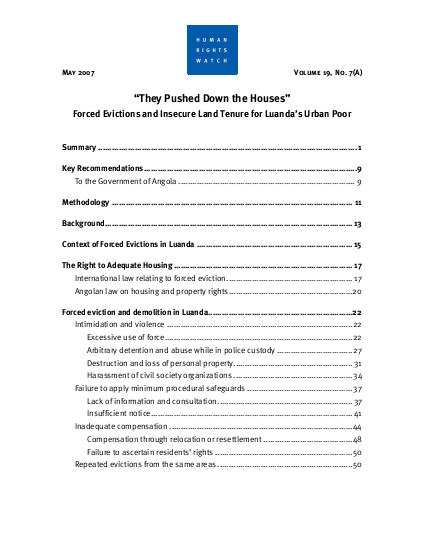
In Luanda, Angola’s capital, the government has forcibly and violently evicted thousands of people living in informal housing areas with little or no notice. In violation of Angola’s own laws and its international human rights obligations, the government has destroyed houses, crops and residents’ personal possessions without due process and has rarely provided compensation.
The evictions have taken place in a city where the majority of the population lives in informal housing areas with lack of clarity over land possession and ownership, and consequent insecurity of land tenure. The victims are poor and vulnerable Angolans. They include women supporting families on their own, elderly persons and children. Many fled to Luanda during the country’s long civil war, seeking shelter and protection from conflict zones or from agricultural areas destroyed by fighting and insecurity. The government’s large scale evictions have resulted in further displacement and left many individuals homeless and destitute with no access to legal remedy.
This report focuses on 18 mass evictions carried out by the government between 2002 and 2006 documented by Human Rights Watch and the Angolan organization SOS Habitat. Other small-scale evictions that took place in the same areas and over the same period are also included in this research. In total, more than 3,000 houses were destroyed and many small-scale cultivated land plots were seized, affecting some 20,000 people.
By documenting forced evictions that occurred between 2002 and 2006, this report provides evidence that such evictions were neither sporadic nor isolated events in Luanda. The forced evictions represent a pattern of abusive conduct on the part of the Angolan government that has not significantly changed over the past several years or been fully addressed. Despite calls from national and international organizations and victims, the government has neither taken the steps necessary to ensure forced evictions end nor provided accountability for abuses associated with these evictions. The Angolan government has also not adequately compensated the vast majority of evictees as it is required to do under Angolan and international law.
Human Rights Watch has not received information that large-scale forced evictions have occurred in Luanda since the field research was completed for this report. However, the residents of the large informal areas of the city remain extremely vulnerable to both new and repeated forced evictions due to the government’s failure to date to effectively address the question of insecurity of tenure. Evictees from the evictions researched for this report and SOS staff members who witnessed such evictions told Human Rights Watch that uniformed police officers and local government officials used intimidation, violence, and excessive force when carrying out evictions.
Resource collections
- Topics
- UN Habitat - Urban Response Collection
- Urban Response - Urban Crisis Preparedness and Risk Reduction
- Urban Response Collection - Community Engagement and Social Cohesion
- Urban Response Collection - Economic Recovery
- Urban Response Collection - Environment and Climate Change
- Urban Response Collection - Housing, Land and Property
- Urban Response Collection - Urban Crisis Response, Recovery and Reconstruction
- Urban Response Collection - Urban Resilience
